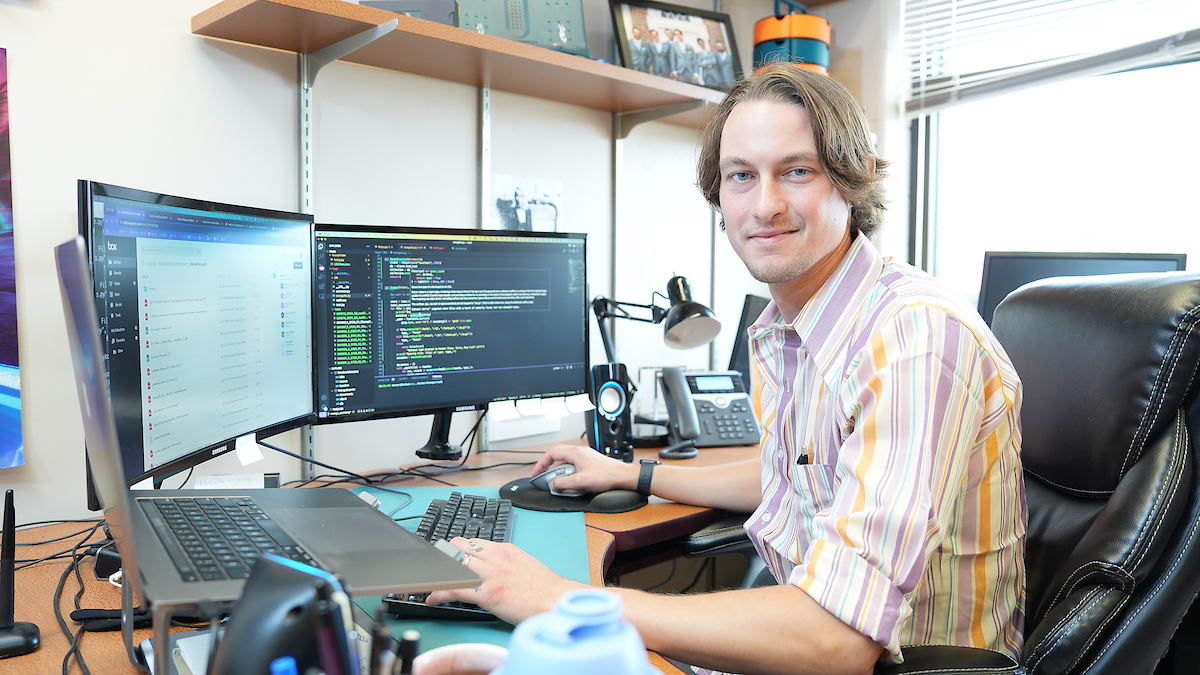Behind the Research: Dane Deemer
About the feature
Many people are involved in the remarkable range of programs, services and facilities that undergird research in the College of Agriculture. Collectively they’re integral to the college fulfilling its research mission. “Behind the Research” explores their individual roles. Each academic year, we profile six people whose work supports the College of Agriculture’s global reputation for developing innovative, multidisciplinary solutions to challenges and then putting those solutions into action.
Dane Deemer, senior computational biologist, Department of Food Science
- Classically trained biologist with interdisciplinary knowledge in computer programming.
- Links computer science to biology in the Diet-Microbiome Interactions Laboratory to facilitate the use of large amounts of data for DNA and RNA sequencing.
- Introduces basic computer science concepts to undergraduate and graduate students, often by helping them automate repeat tasks to increase efficiency.
Dane Deemer brings his background in biology to the crossroads of data generation and computing power — a “sweet spot,” he says.
As a senior computational biologist in the Diet-Microbiome Interactions Laboratory of Stephen Lindemann, associate professor of food science, Deemer does computer science research that’s based around food science applications. He joined the lab in March 2020.
The Michigan native has a bachelor’s degree in biology and anthropology from Albion College and a master’s degree in cellular and molecular biology from Oakland University. Since he’s been at Purdue, he has taken some graduate courses in computer science for his own knowledge and growth.
“I started out being really interested in biology; my graduate research was working with stem cells,” he says. “But I’ve slowly evolved into computer sciences — I’ve always done large data analytics in the field of biology. Now I consider myself more of a computationalist than I am a biologist.”
Deemer’s role is upstream from the wet lab biologists who generate data and analysis. “What I do is take that downstream data and turn it into knowledge, especially in regard to very large data sources that require a lot of processing,” he explains. For example, Deemer works with hundreds of gigabytes of DNA and RNA sequencing data.
He enjoys using technology to produce results quickly. “In the lab, you have to wait on experiments and things to happen. When I’m on my computer and leveraging some of the top compute clusters in the world where speed is insane, I can work at whatever pace I can,” he says.
Until recently, Deemer split his time between his own research and managing the lab. “Now I’m 100 percent scientist,” he says. Even as he phases out of being the lab manager and passes his knowledge to his successor, Deemer remains involved in helping undergraduate and graduate students.
In his interaction with Purdue’s research computing community, Deemer works with system engineers, computer scientists and machine learning specialists. That can be both interesting and difficult, he says. “It’s cool to explore new areas, but sometimes when you’re exploring a lot of areas, you’re a master of none. So one of the challenges is to not feel discouraged when I don’t know everything about all these different fields.”
In one of his current projects, he is working on the infrastructure for a data lake — a scalable system of vast amounts of data. “I’m trying to help architect this lake so that other scientists can come in and fish the lake,” he explains. “Essentially what they’ll do is query the database and say, ‘I just want this subset of things for my particular analyses.’
Deemer says the best of part his job is that Lindemann gives him a great deal of professional freedom. “I wanted a job that I could think about after I’m done working and have no ceiling on,” he says. “I’ve been able to allow my interests to guide my research as long as it’s within the bounds of our grants and what Steve’s doing.”
As the field of biology depends more on computers and large data, biologists will need to become more comfortable with software, Deemer says. His role in introducing food science-focused students and others to the computer science and software engineering world is a natural outcome of his own liberal arts background and education.
“I’m the conduit between the biologists and the computer scientists.”
Away from the computer, Deemer is an avid tennis fan and player who supports the Lafayette Jefferson High School tennis teams. He attended last year’s French Open and the U.S. Open this year, and his dog’s name, Rafa, honors tennis great Rafael Nadal.






